|
|
|
Sort Order |
|
|
|
Items / Page
|
|
|
|
|
|
|
| Srl | Item |
| 1 |
ID:
171873
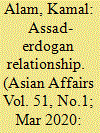

|
|
|
|
|
| Summary/Abstract |
Much has been made of the once brotherly relationship between Syrian President Bashar al Assad and the Turkish President Recep Teyep Erdogan. Indeed, this relationship formed the bedrock of Turkey's much-vaunted move towards the Arab world and its re-engagement with regions on which Ataturk and his successive Kemalist Generals had shut a door. Yet, more than fifteen years after the historic first visits by the Turkish and Syrian leaders to each other's capitals, the Syria-Turkey relationship lies in ruins. Whilst much of the focus of the war in Syria has been on the exaggerated sectarian divide in the Middle East and the great power rivalry between the United States and Russia, a key aspect overlooked is the fundamental relationship between Turkey and Syria. The last two decades of this relationship have been defined by Assad and Erdogan. As Turkey slowly begins to re-engage with Syria one can trace the tumultuous relationship between the two neighbours in the immediate aftermath of the dissolution of the Ottoman Empire. The Arab nationalists and Turkish nationalists have been at daggers drawn over the make up of the border. Syria has never forgotten the land-grab of the Turks in the aftermath of the French exit of the Levant. Furthermore, the diverse set of communities – the Greeks, the Armenians, the Kurds and the Syriacs – that make up the inhabitants of the region still suffer from the effects of the mismanagement of the French exit and what is seen by many of these communities as an illegal annexation by Turks and Arabs. However, under the Syrian Arab Republic the Christians of all denominations including the Armenians and Greeks flourished whilst Turkey forced only one identity upon its once diverse people. This article will argue that the relationship between Syria and Turkey has ebbed and flowed – and this dynamic is rooted in history where successive Turkic dynasties have favoured Syria as their pivot to control the region. Similarly, when Syria became less important, the very foundation of the Turkic and later Turkish influence became weak in the region. The close relationship between Erdogan and Assad overturned more than six decades of animosity, but once Erdogan turned his back to Assad and supported the overthrow of the Syrian government the relationship fell apart. As the end of the war nears, a defining factor to end this war will be how Turkey and Syria reconcile or interact. The Syrian Kurds now seem to be back in Assad's corner as they prefer to be under Damascus' sovereignty then under attack from Ankara across the border. The Kurdish question is of significant value to both Syria and Turkey; it has been a major reason for both countries to be at peace and war. A closer look at the history of these two countries' relationship proves that the Assad-Erdogan relationship has mirrored the history of the two states since the fall of the Ottoman Empire. Their future in more than one way is now inter-twined on how they interact with each other.
|
|
|
|
|
|
|
|
|
|
|
|
|
|
|
|
| 2 |
ID:
158178
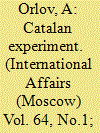

|
|
|
|
|
| Summary/Abstract |
On October 1, the regional powers - the government and the Parliament of Catalonia - carried out a referendum on independence from Spain. The Spanish government (that had gone to all lengths to prevent it) declared its results null and void. Prime Minister of Spain Mariano Rajoy dismissed it as a "democratically deplorable spectacle.
|
|
|
|
|
|
|
|
|
|
|
|
|
|
|
|
| 3 |
ID:
143729
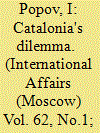

|
|
|
|
|
| Summary/Abstract |
THE FALL OF 2015 brought along an escalation of a separatist conflict in Spain as a movement in Catalonia for the secession of the autonomous region from the country gained momentum. On September 27, Catalonia, which has the official status of an "autonomous community," held early elections for its parliament, which is part of the Generalitat de Catalunya, the historic institution that rules the region and includes its legislature, government and president of the region. The president, who is the head of the Catalonian government, is elected by the regional parliament. September's elections were won by a wide margin by a coalition of two nationalist parties - the ruling Convergéncia Democrática de Catalunya (Democratic Convergence of Catalonia) or CDC and the left-wing Esquerra Republicana de Catalunya (Republican Left of Catalonia) or ERC.
|
|
|
|
|
|
|
|
|
|
|
|
|
|
|
|
| 4 |
ID:
093970
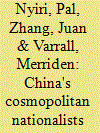

|
|
|
| 5 |
ID:
111722
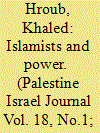

|
|
|
|
|
| Publication |
2012.
|
| Summary/Abstract |
Election results in the post-revolution countries emphasize the prevailing long-term expectation, which is that the next stage in the Arab region will be characterized by the presence of Islamists in power one way or another in more than one Arab country. The Islamists' victory in the Egyptian elections came after that of the Justice and Development Party in Morocco, which in turn came after victory of the Renaissance Movement in Tunisia. In Libya, there are expectations, not far from reality, for the victory of similar Islamist parties or those close to them in the event of organized state elections. In Jordan, Yemen and Algeria no one can underestimate the size of Islamic currents and their access to high ratings in state elections. Although the experience of Arab Islamists in government has not been bright, at least in the cases which we have witnessed in past years in Sudan and Gaza, that has not reduced popular support for these currents. Any failure of these experiments was attributed to external factors - Western pressures and/or Israeli policies in the case of Hamas - more than to the ability of the Islamists and their efficiency in government. Thus, the vast majorities of Arab electorates seem bent on entrusting the Islamists with power for a period of time. Arab publics need to delve into a real and broad experience with the Islamists so they can judge them objectively, away from religious passion and semi-blind support.
|
|
|
|
|
|
|
|
|
|
|
|
|
|
|
|
| 6 |
ID:
137330
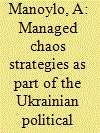

|
|
|
|
|
| Summary/Abstract |
TODAY, there is a lot of talk about the recent initiative of Ukrainian President Poroshenko: temporary ceasefire at the line of confrontation between the Ukrainian punitive forces and the militia of the Donetsk and Lugansk People's Republics. It remains to be seen who will profit from the respite - the population of the republics or the president who feigned peace-seeking to regroup his army battered by the militia, strengthen it with a fresh mob of fanatics and bring armored machinery closer to the frontline.
|
|
|
|
|
|
|
|
|
|
|
|
|
|
|
|
| 7 |
ID:
160181
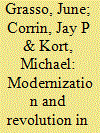

|
|
|
|
|
| Edition |
5th ed.
|
| Publication |
New York, Routledge, 2018.
|
| Description |
x, 239p.pbk
|
| Standard Number |
9781138647053
|
|
|
|
|
|
|
|
|
|
|
|
Copies: C:1/I:0,R:0,Q:0
Circulation
| Accession# | Call# | Current Location | Status | Policy | Location |
| 059448 | 951.05/GRA 059448 | Main | On Shelf | General | |
|
|
|
|
| 8 |
ID:
153409
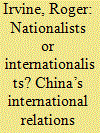

|
|
|
|
|
| Summary/Abstract |
Resurgent nationalism has become an important driver of China’s foreign policy, and many countries are concerned about its evident new assertiveness. This article argues that closer attention to the vigorous internal debate among its international relations (IR) experts about their country’s future external strategies will add perspective to those concerns. It contends that the views of these experts provide probably the best available window into China’s thinking about its international options. China’s IR experts have been conspicuously divided about the appropriate balance of strategies for its transition from a previously cautious and inward-looking foreign policy to a more ambitious and proactive agenda. In particular, they differ about the relative emphasis that should be placed on the pursuit of national interests versus the advancement of international interests. This debate reflects contradictory elements in China’s foreign policy under Xi Jinping, some of which may potentially lead to confrontation and conflict while others hold out the prospect of continuing constructive engagement. Greater understanding of expert views within China about managing and reconciling these contradictory trends is likely to provide valuable insights for researchers and decision-makers in China and other countries.
|
|
|
|
|
|
|
|
|
|
|
|
|
|
|
|
|
|
|
|
|